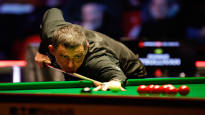Ronnie O’Sullivan has seen dozens of magical game performances over the course of four decades. Saturday’s semi-final at the World Grand Prix goes to the top, writes journalist Atte Husu.
– One of the best sessions I’ve seen him play. Can’t get much better than that. He is artistic, ingenious, poetic… Godly snooker.
1997 World Champion Ken Doherty didn’t mince his words on Saturday night when Ronnie O’Sullivan’s and Ding Junhui The semifinals of the Grand Prix tournament had ended. Doherty praised O’Sullivan, who in his 6–1 win produced four streaks of more than one hundred points (135, 128, 128 and 124) and breaks of 90 and 78 points.
O’Sullivan bagged 189 balls in the match. His sack percentage in seven innings was an incredible 97. The brilliance of the performance is underlined by the fact that Ding bagged 45 balls with a sack percentage of 96.
Such a high percentage for a losing player was only possible because O’Sullivan punished Ding for each of his misses and misses.
One of few
I have been following O’Sullivan’s career since the beginning of 2002. By that time, O’Sullivan, who made his professional debut in 1992, had won five major tournaments: in addition to three UK Championships and one Masters, he had been crowned world champion for the first time in the spring of 2001.
Cut to today. O’Sullivan is an eight-time Masters and UK Championship champion, chasing his eighth world championship in April-May. In addition to the record 23 major victories, O’Sullivan has won the most ranking tournaments (41), made the most maximum breaks (15) and hit streaks exceeding one hundred points (1,240) in professional tournaments, and earned the most prize money (almost 20 million euros).
Since 2002 O’Sullivan has rarely seen fireworks like Saturday.
In the 2007 Northern Ireland Open, he did Ali Carter against five hundred-point hitting streaks in five sets, including a maximum break of 147 points.
In the 2008 World Cup semi-final, he beat the legend of the sport of Stephen Hendry set 17–6 and won the set of the second period 8–0. Ricky Walden experienced O’Sullivan’s speed in the quarterfinals of the 2014 Masters, which O’Sullivan won 6–0. The match lasted less than an hour.
O’Sullivan tends to perform at his best against certain elites. For Ding, Saturday’s jump was anything but the first.
In 2007, O’Sullivan went 10-3 in the Masters final, and in the 2014 Welsh Open final, O’Sullivan went 9-3. As the crown of the title, O’Sullivan bagged the maximum break in the last set, whose bagging of the last red is considered one of the best shots in snooker history.
The aforementioned superb performances are just a scratch of O’Sullivan’s sparkling career in the 21st century. However, Saturday’s performance will put his CV on top.
The answer to the question dawned
The 48-year-old O’Sullivan has been the market face of snooker for 32 years. During that time, several biographies have been written about him and numerous documentaries have been made.
Their recently released The Edge Of Everything has garnered widespread praise in sports circles. Basking in the spotlight for four decades, O’Sullivan has had enough to say, both good and bad.
When it turned out that O’Sullivan will arrive in Tampere in June to play three exhibition matches, I was hardly the only one who pondered the following question in my mind: what to ask O’Sullivan, about whom almost everything has been said and written?
The answer dawned after Saturday night’s semi-final. How does O’Sullivan, who is known as a perfectionist, deal with a performance that most snooker professionals and other individual athletes only dream about?
In the victory interview, O’Sullivan admitted that the performance in the semi-final was unmatched in his career. However, the interviewer did not have time to elaborate on the topic. The moments after the match are not the place for in-depth interviews and, more importantly, O’Sullivan had only just qualified for Sunday’s final. The work was still in progress.
When O’Sullivan arrives in Tampere in June, he can focus on the exhibition matches that offer him the most pleasure. Pleasure is exactly the word that O’Sullivan repeats over and over again in interviews.
It is extremely interesting to hear what kind of emotions O’Sullivan went through after the Grand Prix semi-final match. What was going through the head of the legend of the sport in a performance touching perfection, the kind that had been seen from him the last time 10 years ago?
How ready or interested O’Sullivan himself is to open up his mental landscape is a different matter. The player has been a big question mark when interviewed throughout his career. This has been especially evident recently.
Commitment to interviews is far from guaranteed, but on the game side, O’Sullivan has fewer question marks than ever.
